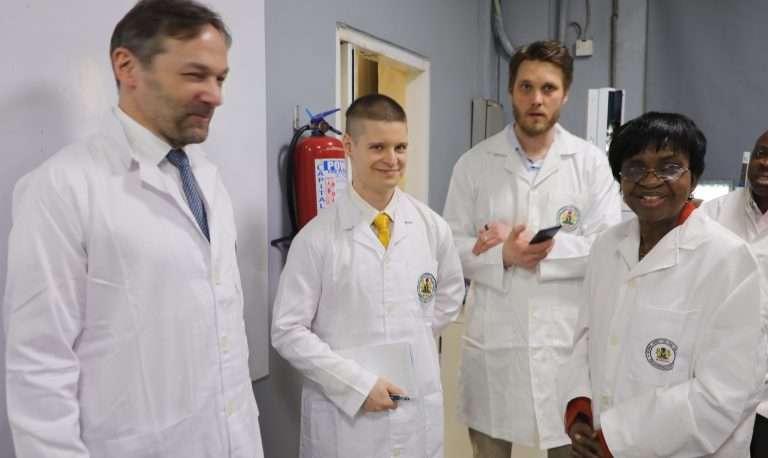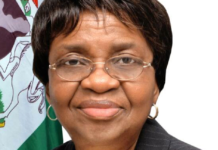
Nigeria has been selected to be eligible for the Organisation for Prohibition of Chemical Weapons (OPWC) laboratory designation due to the massive investment made on the laboratory of the National Agency for Food and Drug Administration and Control (NAFDAC).
The NAFDAC Laboratory can test any chemicals that are related to biological and chemical weapons of mass destruction.
Sayo Akintola, NAFDAC’s resident media consultant, revealed this in a statement issued in Abuja on Sunday, stating that Nigeria and Kenya are the only two African countries that have been selected for consideration by the international organisation.
When experts from the OPCW visited NAFDAC’s Central Laboratory in Oshodi, Lagos on Thursday, they inspected and evaluated the facilities that would be utiliSed for the international task, he disclosed.
Dr Roman Warchol, the leader of the team from Finnish Institute of Verification of Chemical Weapons Convention (FERIVIN) in the University of Helsinki, expressed his satisfaction with the facilities provided by NAFDAC, claiming that they were on par with those of any other developed country. He had come to Nigeria to evaluate the NAFDAC laboratory and determine its capabilities, and he remarked that he was pleased with what he had seen. “I’m very happy and satisfied with what I’ve seen here”, the OPCW chief declared.
The ostensibly elated Director General of NAFDAC, Prof. Mojisola Adeyeye, explained that ‘’we have been on this for about four years. Except for the COVID-19 period which really affected activities’’
She said ‘’we are going on proficiency testing and we have gone from ‘Participation’ to ‘Very Good’ which is the highest level in the OPCW’s assessment’’.
The NAFDAC boss expressed her excitement at the experts from Hague and Helsinki being astounded by the agency’s facilities and commending the competency of NAFDAC staff as well as their level of understanding.
‘’We did all our presentations. There were little or no questions. All we are now discussing is level of improvement, areas that we should improve to make it a bigger say. They were overwhelmed by the commitment of the Agency and the National Authority for Chemical and Biological Weapons Convention (NAC&BWC) in Nigeria, and the Federal Government to the project’’, she enthused.
Prof. Adeyeye further explained: ‘’we are not at war, yes, but we are not only to be testing for Nigeria. We are not only going to be testing the samples that will be used in Nigeria. In Africa, we are the only two sites, Nigeria and Kenya that are being considered for this. We will cover the West Africa and some parts of Africa. Wherever there are skirmishes or the use of weapons, it might not be war situation, but the tendency also that there could be an explosive somewhere, we could be invited to sample those things and then test for the possibility of using harmful chemicals that could be lethal to people. If for example, in Niger State or anywhere for that matter, there was an explosive, we sample it and see what is the byproduct to ascertain if it would be lethal to people when they come in contact to them.
Prof. Adeyeye indicated that NAFDAC is responsible for the monitoring and regulation of industrial and laboratory chemicals, in accordance with its mission, through the Directorates of Chemical Evaluation & Research, Narcotics and Control Substances, and Laboratory Services (Food & Chemicals).
Recalling the past, she revealed that in February 2018, the Chairman of the National Authority for the Prohibition of Chemical and Biological Weapons Convention (NAC&BWC), accompanied by his representatives, had visited the NAFDAC Central Laboratory in Oshodi to inspect the premises for participation in the OrganiSation for the Prohibition of Chemical Weapons (OPCW) testing of materials related to chemical weapons. Subsequently, in October 2018, the agency was part of CCACT-097. With the agency’s most recent participation in CCACT-15 in October 2022, the rating has now improved to Very Good.
She further disclosed that the Nigerian Federal Government through NAC&BWC provided an intervention fund in February 2020 valued at about N735m to provide various equipment for the laboratory, stressing that through internally generated revenue, more equipment pieces were added. Since then, the Agency had used her IGR to add more equipment pieces.
She said that the agency will also expand the laboratory space for OPCW in the new building to be constructed soon.
‘’The assistance and contribution of the United Kingdom in assessing and improving the technical competence of laboratory in OPCW member states in Africa and Group of Latin America and Caribbean Countries (GRULAC)GRULAC regions which we benefited has helped since 2021 to improve our performance and technical capacity’’, she said, adding that NAFDAC staff have participated in the mentorship programme by Finnish Institute for Verification of the Chemical Weapons Convention VERIFIN Helsinki.
Prof. Adeyeye said this was done virtually until their physical training in February 2023. According to her, these efforts helped to improve technical ability of staff and their reporting techniques.










